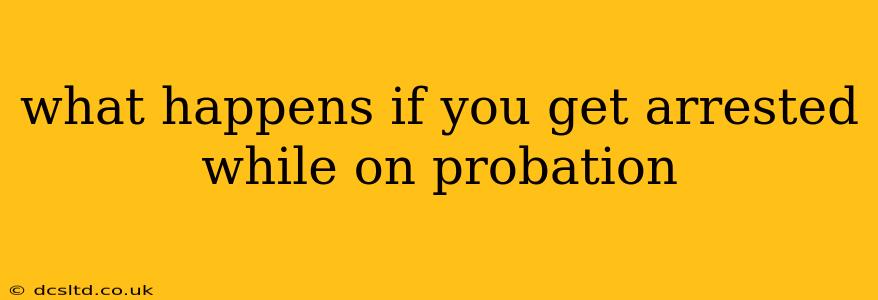What Happens if You Get Arrested While on Probation?
Getting arrested while on probation is a serious matter with potentially severe consequences. It triggers a violation of your probation terms, leading to a complex legal process with significant implications for your freedom and future. The exact outcome depends on several factors, including the nature of the new arrest, your probation terms, and the judge's discretion. Let's explore the potential repercussions in detail.
What are the immediate consequences of an arrest during probation?
Immediately following your arrest, your probation officer will be notified. This notification triggers a series of events, starting with a probation violation hearing. This hearing determines whether the new arrest constitutes a violation of your probation agreement. Even if the new charges are ultimately dropped, the arrest itself could still be deemed a violation, depending on your probation conditions. You will likely be held in custody until the hearing can be scheduled and conducted.
What happens at a probation violation hearing?
The probation violation hearing is a crucial step in the process. The prosecution will present evidence to show that you violated the terms of your probation. This evidence could include the arrest report, witness testimonies, or other relevant documentation. You have the right to legal representation and to present your own defense. The judge will review all evidence and determine whether a violation occurred.
What are the potential penalties for a probation violation?
If the judge finds that you violated your probation, several penalties are possible:
- Revocation of Probation: This is the most severe consequence, resulting in the immediate return to jail or prison to serve the original sentence. The length of time remaining on your original sentence will be determined by the judge.
- Modification of Probation Terms: The judge might modify your probation terms, making them stricter. This could involve additional conditions, such as increased reporting frequency, mandatory drug testing, or participation in more intensive rehabilitation programs.
- Increased Supervision: Your level of supervision might increase, possibly requiring more frequent meetings with your probation officer or the use of electronic monitoring.
- Additional Fines or Fees: You could face additional fines or fees related to the probation violation.
- Jail Time: Depending on the severity of the violation, the judge may impose a jail sentence for the violation itself, in addition to, or instead of, revoking your probation.
Does the nature of the new arrest matter?
Yes, absolutely. The nature of the new arrest significantly influences the outcome of the probation violation hearing. A minor offense might result in a modified probation plan, while a serious felony could easily lead to probation revocation. The judge will consider the severity of the new offense, your criminal history, and your overall compliance with probation terms while making a decision.
What if the new charges are dropped?
While charges being dropped might seem like a positive development, it doesn't guarantee you'll avoid probation revocation. Your probation officer and the judge will likely still consider the arrest itself as a violation of your probation agreement, particularly if it resulted in a breach of conditions (such as avoiding new arrests).
How can I avoid probation violations?
The best way to avoid probation violations is to strictly adhere to the terms of your probation agreement. This involves:
- Regularly reporting to your probation officer: Maintain consistent communication and attend all scheduled meetings.
- Following all court-ordered rules and regulations: This could include restrictions on your movements, associations, and activities.
- Avoiding any further legal trouble: This includes staying away from any illegal activities, even seemingly minor ones.
- Participating in any required programs: If you're mandated to attend drug treatment, anger management, or other programs, actively participate.
Getting arrested while on probation is a critical situation requiring immediate legal counsel. Consulting with an experienced criminal defense attorney is crucial to protect your rights and explore the best possible outcome. Your lawyer can help you understand your options, prepare for your hearing, and present a strong defense. Remember, your actions during probation have significant consequences, and proactive legal guidance is vital.
